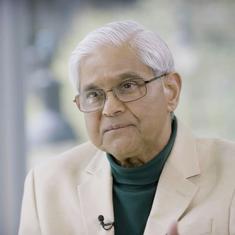S Jaishankar meets Sri Lankan president, finance minister amid country’s economic crisis
The Union external affairs minister reached Sri Lanka on Sunday to attend the BIMSTEC summit.

Union External Affairs Minister S Jaishankar met Sri Lankan President Gotabaya Rajapaksa and Finance Minister Basil Rajapaksa on Monday amid an ongoing economic crisis in the neighbouring country.
Jaishankar reached Sri Lanka on Sunday to attend the Bay of Bengal Initiative for Multi-Sectoral Technical and Economic Cooperation, or, BIMSTEC summit.
“Discussed the economic situation and India’s supportive response,” Jaishankar wrote in a tweet after his meeting with Rajapaksa. “We will continue to be guided by Neighbourhood First.”
After his meeting with the president, Jaishankar said that he and Rajapaksa “reviewed various dimensions of the close neighbourly relationship” between India and Sri Lanka.
Pleased to call on President @GotabayaR of Sri Lanka.
— Dr. S. Jaishankar (@DrSJaishankar) March 28, 2022
Reviewed various dimensions of our close neighbourly relationship.
Assured him of India’s continued cooperation and understanding. pic.twitter.com/xAvCEuxhYV
Later on Monday, Jaishankar will also hold meetings with Sri Lankan Foreign Minister GL Peiris, members of the country’s Opposition, and of political parties which represent the Tamil and Muslim communities, reported The Hindu.
Sri Lanka is hosting this year’s BIMSTEC summit, scheduled to be held between March 28 and March 30. The summit will include both virtual and in-person meetings. Prime Minister Narendra Modi will attend the summit virtually on March 30, PTI reported. Apart from India and Sri Lanka, other countries participating in the summit are Bangladesh, Myanmar, Thailand, Nepal and Bhutan.
This is the first time Jaishankar is visiting the island nation since India extended a line of credit worth $1 billion (over Rs 7,600 crore) on March 18 to support Sri Lanka to manage its ongoing foreign exchange crisis.
The short term concessional loan will be provided by the State Bank of India. The aid will enable Sri Lanka to import food, essential commodities and medicines from India.
Sri Lanka is facing problems in paying for imports due to its foreign reserves being at an all-time low. The nation had declared an emergency in August last year. It is facing an acute shortage of fuel and gas along with essential foods and supplies.
Nearly 30 lakh students had their school tests postponed last week over a shortage of paper and ink, reported Al Jazeera.
In January, India had offered an assistance of $1.4 billion (over Rs 10,661 crore) to Sri Lanka. However, the total aid will only partially help mitigate Sri Lanka’s ongoing economic meltdown.
Shortage of supplies has led to sporadic incidents of violence with residents jostling to buy fuel and other essential items. A man was stabbed to death on March 21 in an argument with a driver, while three elderly citizens died the week before while waiting to buy fuel in the sweltering heat, the police said.
The Sri Lankan government had on March 22 deployed soldiers at petrol pumps across the country as protests erupted with people standing in queues to buy fuel, which is in short supply.
The government also announced that it was seeking to restructure its debt and was looking for an international law firm to advise on the legal implications.
The statement came after Rajapaksa had said the country will seek a bailout from the International Monetary Fund. But the financial institution had noted that the government’s foreign debt burden of $51 billion (over Rs 3.88 lakh crore) was unsustainable.









